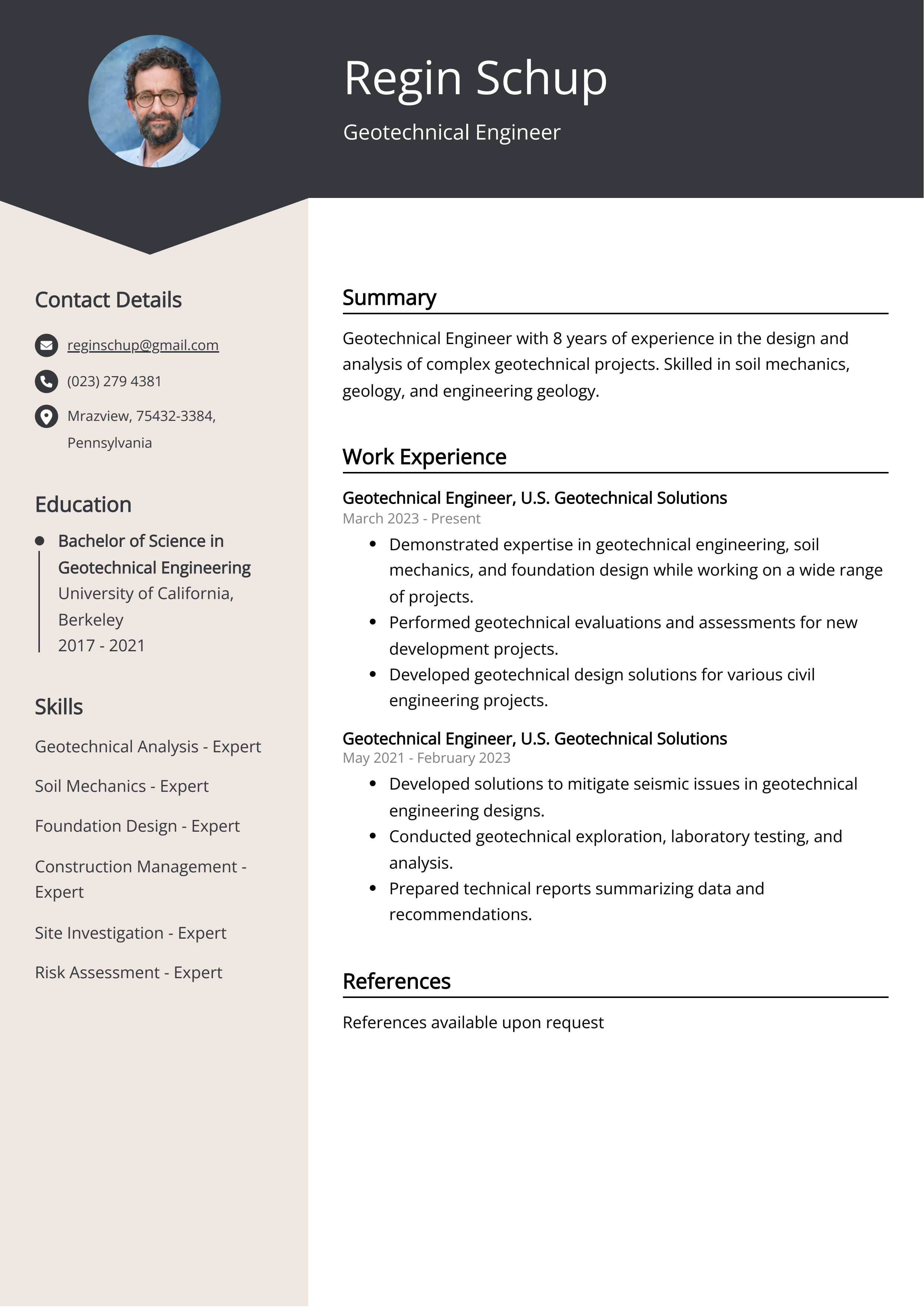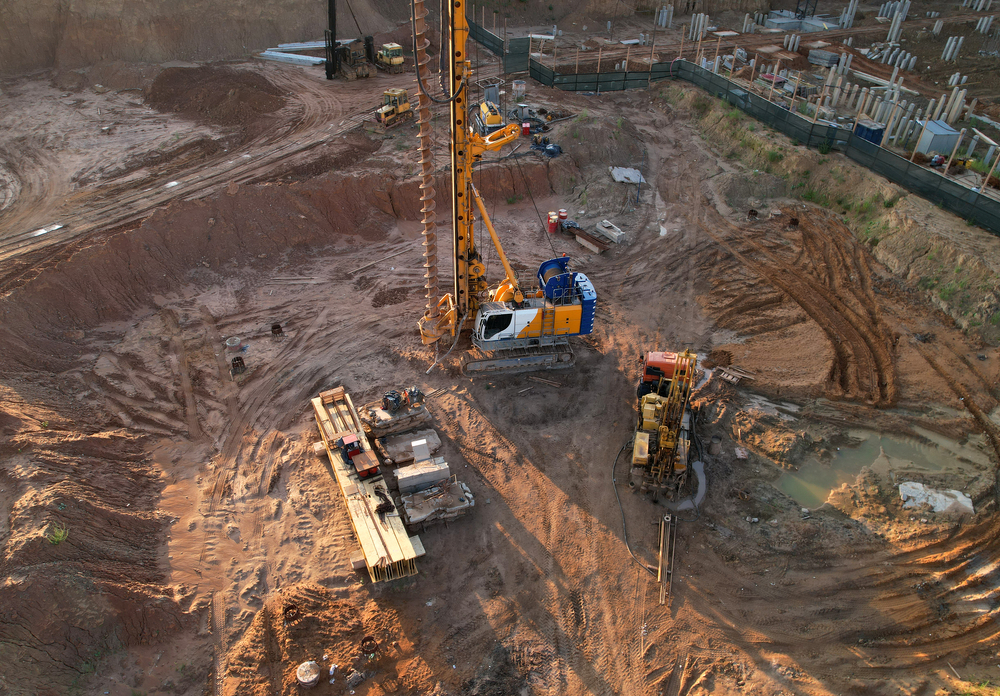Geotheta Can Be Fun For Everyone
Geotheta Can Be Fun For Everyone
Blog Article
Geotheta Things To Know Before You Get This
Table of ContentsHow Geotheta can Save You Time, Stress, and Money.Facts About Geotheta Revealed3 Simple Techniques For Geotheta10 Simple Techniques For GeothetaIndicators on Geotheta You Should Know

They carry out website examinations, collect samples, execute research laboratory tests, and assess information to evaluate the suitability of the ground for building projects - Geotechnical Engineers. Based upon their findings, geotechnical designers supply recommendations for structure design, incline stability, retaining structures, and mitigation of geotechnical dangers. They team up with various other experts, such as architects, structural designers, and construction teams, to guarantee that geotechnical considerations are integrated into the general job style and application
By analyzing the actions and properties of soil and rock, they can recognize possible geotechnical threats such as landslides, dirt negotiation, or slope instability. Their experience aids stop failings or accidents that could endanger lives and home. Here are some comprehensive obligations and duties of a geotechnical engineer: Website Examination: Geotechnical designers conduct site investigations to gather information on subsurface conditions.
They interpret the data to comprehend the buildings and actions of the dirt and rock, including their toughness, permeability, compaction characteristics, and groundwater conditions. Geotechnical Analysis and Style: Geotechnical designers assess the data collected during site examinations to assess the security and viability of the site for construction tasks. They do geotechnical calculations and modeling to examine variables such as bearing capability, settlement, slope security, side planet pressures, and groundwater circulation.
Fascination About Geotheta
Foundation Design: Geotechnical designers play a crucial duty in developing foundations that can securely support the intended framework. They examine the dirt conditions and lots demands to identify the appropriate structure type, such as superficial structures (e.g., footings), deep foundations (e.g (https://www.storeboard.com/geotheta)., piles), or specialized techniques like dirt renovation. They consider factors such as settlement limits, birthing capacity, and soil-structure communication to develop optimum foundation layouts
They review construction strategies, display website tasks, and perform field examinations to confirm that the design recommendations are followed. If unpredicted geotechnical problems develop, they analyze the circumstance and give recommendations for remediation or changes to the design. Threat Analysis and Reduction: Geotechnical designers examine geotechnical dangers and threats connected with the project site, such as landslides, liquefaction, or soil erosion.

Collaboration and Interaction: Geotechnical engineers function closely with other professionals entailed in a job, such as engineers, architectural designers, and building and construction teams. Reliable communication and collaboration are necessary to integrate geotechnical factors to consider right into the total project layout and construction procedure. Geotechnical designers provide technological experience, solution inquiries, and ensure that geotechnical demands are satisfied.
10 Easy Facts About Geotheta Described
Below are some sorts of geotechnical engineers: Foundation Engineer: Structure designers focus on designing and analyzing structures for structures. They analyze the soil problems, lots requirements, and website qualities to figure out one of the most proper foundation kind and style, such as shallow foundations, deep structures, or specialized strategies like pile foundations.
They examine the variables affecting slope security, such as soil residential properties, groundwater problems, and incline geometry, and create strategies to avoid slope failures and mitigate dangers. Earthquake Engineer: Earthquake designers specialize in evaluating and creating frameworks to withstand seismic forces. They analyze the seismic danger of a site, evaluate dirt liquefaction capacity, and create seismic design standards to guarantee the safety and security and strength of structures during earthquakes.
They execute area screening, gather examples, and analyze the collected data to characterize the soil properties, geologic formations, and groundwater conditions at a site. Geotechnical Instrumentation Designer: Geotechnical instrumentation designers focus my review here on monitoring and gauging the habits of soil, rock, and frameworks. They mount and preserve instrumentation systems that keep track of aspects such as soil negotiation, groundwater degrees, incline motions, and structural displacements to analyze efficiency and supply early warnings of possible issues.
The Greatest Guide To Geotheta
They carry out tests such as triaxial examinations, combination examinations, straight shear tests, and leaks in the structure tests to collect data for geotechnical analysis and layout. Geosynthetics Engineer: Geosynthetics engineers specialize in the style and application of geosynthetic products, such as geotextiles, geogrids, and geomembranes. They make use of these materials to enhance dirt security, strengthen slopes, provide drainage solutions, and control disintegration.
They have a tendency to be investigative people, which suggests they're intellectual, reflective, and analytical. They are interested, methodical, rational, logical, and logical. A few of them are additionally social, meaning they're kind, generous, cooperative, person, caring, useful, understanding, sensible, and friendly. Does this sound like you? Take our totally free job test to discover out if geotechnical designer is among your top occupation matches.
In the office setting, geotechnical designers make use of specialized software tools to carry out calculations, create layouts, and examine data. They prepare records, testimonial task specs, interact with customers and staff member, and coordinate task tasks. The workplace setting offers a helpful environment for research, analysis, and cooperation with other professionals involved in the project.
The Greatest Guide To Geotheta
They frequently visit job sites to carry out site examinations, evaluate geotechnical conditions, and collect information for analysis. These sees involve taking a trip to different areas, often in remote or difficult terrains. Geotechnical designers might carry out soil tasting, conduct examinations, and screen building and construction activities to make certain that the geotechnical elements of the project are being executed properly.
Geotechnical engineers additionally operate in specialized geotechnical laboratories. In these centers, they carry out experiments, perform tests on dirt and rock examples, and analyze the engineering residential or commercial properties of the products. Geotechnical laboratory designers function thoroughly in these atmospheres, taking care of screening equipment, running tools, and recording data. They team up with other laboratory team to ensure precise and reliable screening results.
Report this page